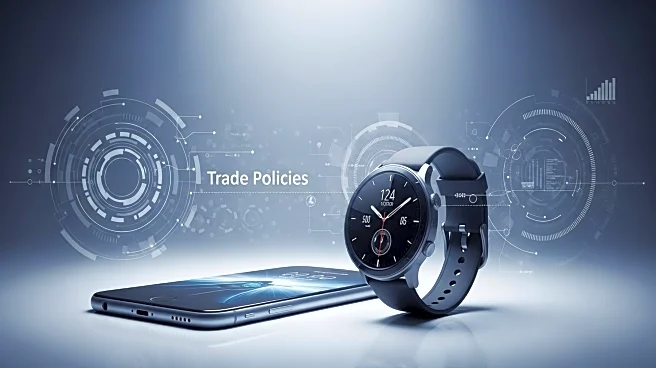What is the story about?
What's Happening?
The ongoing IFA 2025 tech conference in Berlin has highlighted the challenges faced by tech companies in shipping products to the U.S. due to President Trump's tariff policies. These tariffs have led to increased pricing and limited availability of new gadgets for American consumers. Companies like DJI, known for drones, have been effectively barred from importing their products to the U.S., leaving consumers unable to access certain innovative technologies. Other companies, such as Roborock and SwitchBot, have delayed or withheld U.S. launches due to the uncertain pricing and availability caused by these tariffs. The conference has revealed a shift from an era of affordable tech to one where products are increasingly expensive and scarce.
Why It's Important?
The impact of President Trump's tariff policies on tech imports is significant for U.S. consumers and the tech industry. These policies have created barriers for international companies, leading to reduced access to cutting-edge technology for American consumers. The tariffs have also resulted in higher prices, affecting consumer purchasing power and potentially slowing down technological adoption in the U.S. market. Companies that cannot navigate these tariffs may choose to bypass the U.S. market altogether, which could lead to a decrease in innovation and competitiveness within the American tech industry. This situation underscores the broader economic implications of trade policies on consumer access and industry growth.
What's Next?
As companies continue to grapple with the effects of tariffs, they may adopt a wait-and-see approach, hoping for changes in U.S. trade policies. Some may seek alternative strategies to enter the U.S. market, such as forming partnerships or adjusting their business models to comply with tariff demands. The tech industry will likely lobby for policy changes to reduce barriers and improve market access. Meanwhile, U.S. consumers may need to adjust to longer product cycles and higher prices, potentially influencing purchasing behavior and market dynamics. The future of tech imports will depend on the administration's willingness to reconsider its trade policies.
Beyond the Headlines
The tariff situation raises ethical and economic questions about the balance between national security and consumer access to technology. It also highlights the potential for long-term shifts in global trade relationships and the positioning of the U.S. in the international tech market. Companies may need to innovate in their approach to circumvent trade barriers, which could lead to new business models and partnerships. The cultural impact of reduced access to technology could affect consumer expectations and the pace of technological advancement in the U.S.















